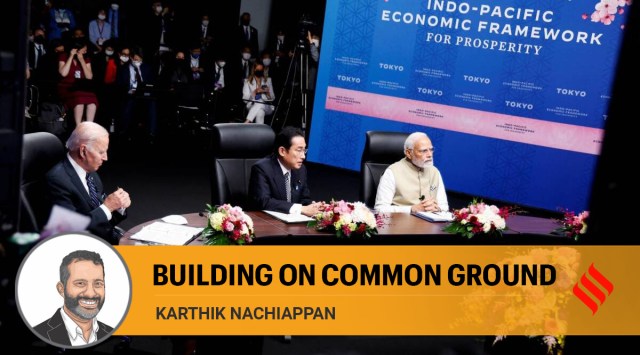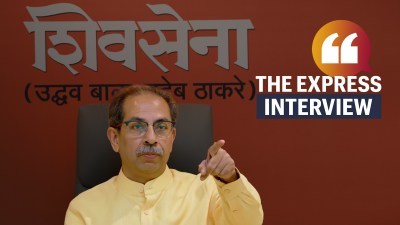- India
- International
What IPEF offers India: Opportunities, tough negotiations
Karthik Nachiappan writes: Indo-Pacific Economic Framework will generate fierce regulatory battles amongst bureaucrats and regulators in each country to ascertain which commitments advance and which hurt domestic interests
 US President Joe Biden, India's Prime Minister Narendra Modi and Japan's Prime Minister Kishida attend the Indo-Pacific Economic Framework for Prosperity (IPEF) launch event at Izumi Garden Gallery in Tokyo, Japan, May 23, 2022. (REUTERS/Jonathan Ernst)
US President Joe Biden, India's Prime Minister Narendra Modi and Japan's Prime Minister Kishida attend the Indo-Pacific Economic Framework for Prosperity (IPEF) launch event at Izumi Garden Gallery in Tokyo, Japan, May 23, 2022. (REUTERS/Jonathan Ernst)The official launch of the Biden Administration’s Indo-Pacific Economic Framework (IPEF), the US’s de facto foreign economic policy for Asia, has been lauded and welcomed. Countries like India that hew close to the United States have ostensibly breathed a sigh of relief after months of waiting for the administration to deliver a regional economic strategy to accompany its security focus. IPEF proponents, which now include the US and a dozen Asian countries, extol its purpose and potential, particularly given some doubts over whether the US administration could sustain its focus in Asia as war broke out in Europe. Besides Ukraine, the IPEF’s importance also owes to China’s patent economic footprint across Asia that could be checked by an alternative economic paradigm that emphasises openness, flexibility, and integration. Can the IPEF deliver on its promise? What drives its logic? And can the framework yield gains for the United States, India, and other signatories?
The IPEF is not a trade or investment agreement between 13 signatories. It’s a framework or a starting point for these Indo-Pacific countries to regulate trade and commerce across four key pillars: Digital economy, supply chains, clean energy, and governance. The IPEF’s focus on these pillars reflects the Biden administration’s desire to address constraints left by Covid-19 globally, namely inflation and supply chain shocks, and devise new standards to advance Biden’s domestic economic agenda, specifically climate change, tax evasion, worker rights, and retaining America’s technological primacy.
Globally, the IPEF signifies the first multilateral attempt to boost supply chain resilience to ease global inflationary pressures and mitigate effects of future disruptions, particularly key raw materials, critical minerals, and semiconductors. The IPEF also represents an effort to negotiate “high-standard” rules between like-minded countries to govern the digital economy, particularly data flows, propel climate mitigation through carbon removal purchasing commitments, and tilting power in the global economy toward workers through equitable global tax, anti-money laundering and anti-bribery provisions.
The IPEF, in a nutshell, internationalises Biden’s economic agenda to protect and prolong America’s economic leadership across Asia while chipping away at China’s ascendance through compelling signatories to negotiate domestic standards that comport with Washington’s vision. Biden wants to play the long game — introduce a 21st century economic arrangement that reinforces a domestic growth agenda embracing labour rights, productivity, and using market incentives and fiscal spending to reduce inequality, deter environmental damage, foster digital openness and connectivity, and expand tax compliance.
Yet, the merits of Biden’s economic agenda to uphold American primacy could dent how other signatories regulate their domestic economies. IPEF commitments and standards that other signatories like India have to accede to, while negotiating broad commitments and internalising them domestically as standards, will likely facilitate US MNCs’ access to Asian economies at the expense of domestic preferences. The IPEF’s pillars — climate, digital, supply chains, and governance reforms — could clash with and supersede these countries’ policy preferences on such issues.

For instance, the US’ preference to allow free and open data flows under the digital economy pillar will constrict India’s ability to regulate data for domestic purposes. India’s long delayed data protection legislation favours government regulation and handling of data despite recent concessions made to share this burden with foreign and domestic firms. Should US officials push for a liberal data flows standard, it will create a difficult choice for Indian officials given their inability to settle prevailing data governance quandaries. Nor are Indian officials generally open to syncing their tax policies to mesh with the Biden push for a global tax standard amongst US partners to mitigate tax avoidance and evasion despite calls that the measure would generate additional financial resources for developing countries. Qualms aside, the IPEF remains attractive for India given its flexibility and open nature, allowing Delhi to demonstrate its political commitment to the United States to jointly shape the rules governing the Indo-Pacific’s economic future even as competitors lurk.
That said, tough policy choices, like the one on data and taxation, must be made by Indian officials while negotiating the terms of the IPEF accession without sufficient carrots from the US to draw in and sustain countries like India. The IPEF does not grant market access to the United States or include tariff reduction provisions, ostensibly due to the perils of trade politics in Washington. Instead, the IPEF empowers the Biden administration to shape rules across several critical pillars that will condition America’s economic engagement in the Indo-Pacific amid competing economic paradigms, notably the Chinese through the BRI and Europe through a bevy of digital policies and standards.
What’s clear is that the IPEF represents both a mirage and aspiration. Collectively, it represents a leap into an unknown that has to be negotiated amongst partners that share interests and some values. And individually, it will generate fierce regulatory battles amongst bureaucrats and regulators in each country to ascertain which commitments advance and which hurt domestic interests. Washington should hope that the conditions for the former trump the latter when the negotiations begin.
The writer is Research Fellow atthe Institute of South Asian Studies, National University of Singapore
EXPRESS OPINION
More Explained
Apr 20: Latest News
- 01
- 02
- 03
- 04
- 05










































